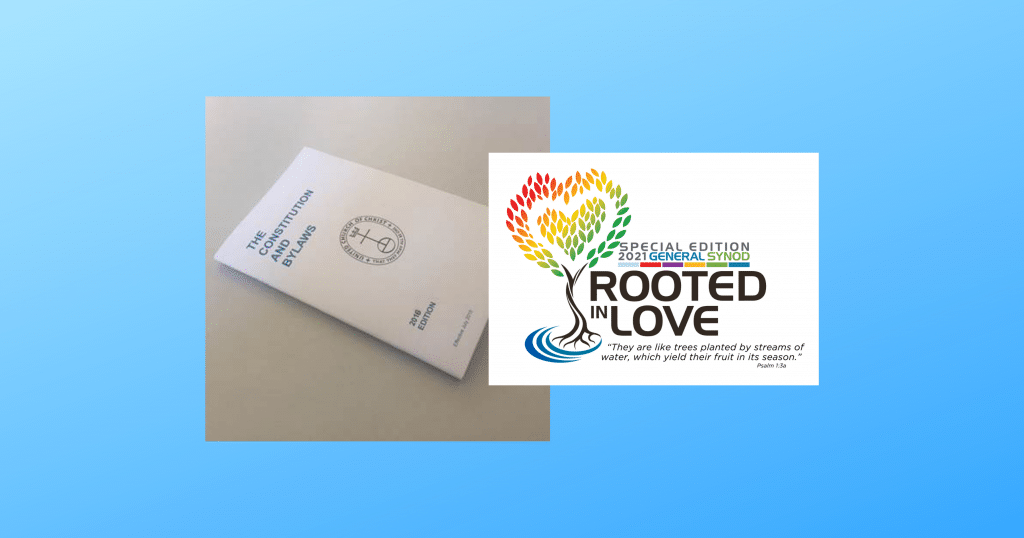Synod approves nonbinary bylaw language — and keeps Robert’s Rules
United Church of Christ delegates cared enough about Robert’s Rules of Order to give them a separate vote at this year’s General Synod.
The result: those rules will still be named in the UCC Bylaws as the way to conduct Synod meetings.
The debate and vote took place July 18 during the closing plenary of the weeklong, online Synod. And in a separate matter, delegates approved the rest of the United Church of Christ Board’s recommended bylaw updates. These added expansive language about gender and made certain internal structural updates.
Where rules are mentioned
The Robert’s Rules debate was actually not mainly about the value of that form of parliamentary procedure.
It was mostly about where meeting rules should be described and how hard it should be to change them.
The UCCB had proposed deleting the bylaws’ reference to Robert’s Rules to make alternatives easier to consider in the future. But as the chair of the Board’s Governance Committee had explained, the Board had no immediate plans to remove it from another document — the Synod Standing Rules — as the way to run meetings.
Varied opinions
Once they had agreed to deliberate on the matter separately from other bylaw changes, delegates shared varied opinions.
- For the Rev. Eric Anderson, from Hawaii, it was a matter of who should have authority to decide how meetings are run. “I have no great affection for Robert’s Rules as opposed to any other rules.” But he urged a “no” vote because “I do believe that the rules of business for General Synod belong in the bylaws, under the authority of the General Synod to change, rather in the Board as the standing rules are.”
- The Rev. Libby Tigner, from Southern California Nevada, felt the opposite way. “I do believe that the standing rules is the appropriate place for designations of how General Synod should be governed and ruled,” she said. “Having it out of the bylaws and in the standing rules actually provides us a great deal of flexibility and the ability to be nimble should we need to, given the variety of settings that we might be looking forward to for potential virtual General Synods.”
- “Nimble,” in this case, was not an attractive value the Rev. Jon Prain of Illinois. Deleting Robert’s Rules, he said, would make it “too easy to change things too quickly — to move the goal posts, change the rules as we go. I want us to have it stay in the bylaws so we have to have some thought, some intentionality, and it takes greater effort to change the rules.”
The proposal to delete the bylaw reference to Robert’s Rules actually got more “yes” votes from delegates (273) than “no’s” (225). But that was less than the two-thirds majority the proposal needed to pass. (Fifty-three delegates abstained.)
New, nonbinary language
By a vote of 510 to 23, with 20 abstentions, the Synod approved all the other bylaw changes the Board had proposed. Detailed here, they included:
- Language changes, as requested by the 2019 General Synod, “that include gender-expansive language and welcome persons of all gender identities and expressions into service as General Synod Delegates and as members of the United Church of Christ Board.
- A change in the membership of the Synod’s Credentials Committee. It will now be composed of UCC Board members. Previously it was composed of a group of Synod delegates who had to be convened three months in advance. “The rationale for this change is that the Credentials Committee is largely staff-driven and staff spend a good deal of time trying to identify delegates who qualify for the Credentials Committee and are willing to serve, as well as trying to schedule and prepare information for meetings,” said the Rev. Carla Gregg-Kearns, chair of the Board’s Governance Committee. She said a group of Board members, “who are familiar with the UCC bylaws and delegate demographic requirements,” will be able to complete the work more easily.
- Removal of an entire section about the UCC’s Common Services Corporation. The CSC had been established to serve a national UCC structure that took effect in 2000. At that time, each of four Covenanted Ministries had its own board of directors. Today’s UCC Board structure is more centralized. Gregg-Kearns said there was no longer much need for a CSC Board composed of staff members of the Covenanted Ministries. “Operations today are much more unified and the role of staff on the CSC governing board is perfunctory,” she said.
Related News
A Prophetic Call for Justice and Peace in Palestine
The executive leaders of the United Church of Christ have issued the following statement...
Read More‘Love is Greater Than Fear’: Regional Youth Events get to the heart of gospel message
United Church of Christ teens attending this summer’s Regional Youth Events (RYE) are...
Read MoreUCC desk calendars available to order now
Prepare for your day, month and year with the United Church of Christ desk calendar —...
Read More


